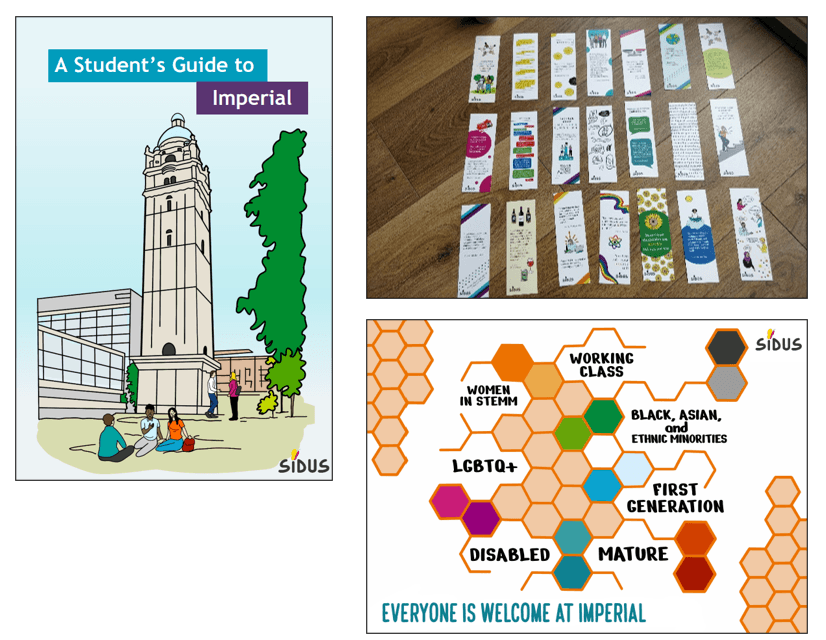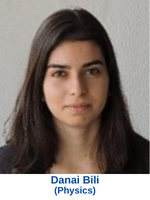Sharing their staff-student partnership approach to co-develop EDI pedagogical materials by Dr Tiffany Chiu (Staff partner), Dr Órla Meadhbh Murray (Staff partner) from Centre for Higher Education Research and Scholarship (CHERS), and Marine Coispeau (Student partner) from Life Sciences at Imperial College London.
The context for our staff-student partnership
With an increasing number of students from underrepresented backgrounds in Science, Technology, Engineering, Mathematics and Medicine (STEMM) at Imperial, it is important that we support all students’ sense of belonging, participation and engagement in learning.
Our staff-student partnership involved turning educational research data into evidence-based resources to promote inclusion, educational aspirations and student success at the university. Using rich interview data (110 interviews with underrepresented students) from the Supporting the Identity Development of Underrepresented Students (SIDUS) Project, we collaboratively produced a student handbook, bookmark and poster campaigns. These materials are attentive to equality, diversity, and inclusion issues such as imposter syndrome, mental health, accommodation, and what to expect in your first week/month/term at Imperial, including reassuring students about their first assessments. We also created a Staff Guide to Distributing and Using SIDUS Materials with suggested activities for staff to use the materials in their teaching and student induction events. We wanted to impact university culture across all departments and year groups, and this guide provided an accessible format for staff to embed the materials into their work.

The staff-student partnership model challenges the traditional power relationship between staff and students, undermining hierarchies and equally valuing the contribution and expertise of staff and students. Our team worked flexibly to accommodate different working patterns, opinions, and backgrounds while still working towards a collective goal: to develop authentic and accessible pedagogical resources to promote inclusion and diversity for STEMM underrepresented students at Imperial.
Initially, our team intended on working on the project in person in summer 2021; however, given COVID-19 we had to work remotely from four European countries: England, France, Greece and Poland. Our team held weekly online meetings, with clearly defined tasks/timelines and regular communications via Microsoft Teams. Overall, the partnership approach has been extremely effective. Below, we reflect on how we created this successful staff-student partnership.
From staff perspectives
As staff, we valued student voices both through the interviews and our student partners' voices when co-developing the materials. It was particularly important to embed student voice throughout the project to ensure the resources resonated with our intended audience: students. We worked with student partners through the StudentShapers programme which provides a bursary to financially support each student partner throughout the staff-student partnership projects.
Meet the SIDUS team





To promote an inclusive working environment, we actively created a supportive space for student ideas and feedback, making joint decisions about the direction of the project. Instead of a top-down approach, the partnership model required us to value students' expertise, skills, and networks. Our 'bottom-up' approach to creating inclusive change has been particularly effective because our student partners were able to retain a more authentic student voice in the materials and had a sense of ownership over the project. They were also essential to distributing the materials via their social, student society, and academic networks to maximise student engagement with the materials.
The power dynamics between staff and students are fundamentally important to acknowledge and address, to ensure students feel able to push back against ideas or methods with which they disagreed. This model can be uncomfortable because it challenges the traditionally hierarchical structure of learning and working relationships in universities. We had to lean into the vulnerability and uncertainty of not having full control over the project. As Healey et al. (2014: 55) discuss: ‘partnership between students and staff involves questioning and sometimes letting go of existing and familiar ways of working and learning, and requires instead trust in a shared process that is inherently unpredictable in its outcomes’.
While staff-student partnership involves the delegation of roles and responsibilities and giving students autonomy over sections of work, this does not mean the work is done without support. It was crucial that we scaffolded the students' work, with a clear structure of meetings, timelines, overall aims and rationales of the project, and a comprehensive introduction to the project to contextualise their work. We also provided extensive, ongoing feedback during the material generation process, allowing the students to do the work but with sufficient support and encouragement. This regular contact also ensured each team member felt comfortable raising any queries or concerns.
From student perspectives
The Imperial StudentShapers programme allowed us to work alongside staff members to positively impact the student experience, develop innovative teaching practices and enhance existing curricula. As student partners, we were always encouraged to challenge ideas while being trusted with delegated responsibilities in a full-time professional setting.
Student Partners



The handbooks, posters and bookmarks were inspired by real student challenges and experiences. These were written in an encouraging, honest and informal tone, translating educational concepts and resources into a more student-friendly style and addressing the more emotional (and often shared) aspects of student life. We also worked on later project stages including disseminating materials, leading focus groups, contributing to the ‘What it means to be an Imperial student?’ induction sessions, and communicating resources to Advance HE.
Maintaining a healthy work-life balance was key to the success of the partnership. The staff were very understanding of personal circumstances which could affect our work during the summer and pushed for flexible working schedules. We were also given the space and flexibility to explore new areas such as qualitative research and educational resource design, which were different to those encountered in our degrees. The extracts below are from our end-of-project reflection session:
“Very insightful, new experience. Being honest and critical towards members of staff changed my perspective of what student role is. Meetings were always an opportunity to share some thoughts, I liked getting feedback as it was always backed with a lot of interesting comments from the experiences of the staff members. The personal approach was always very supportive, which I found extremely important.”
Working on promoting the inclusion and sense of belonging of all students at Imperial also allowed us to reflect on our own experiences as students. We were given the space to reflect on themes such as microaggressions, mental health, and imposter syndrome. The clearly defined project also allowed us to further reinforce our interpersonal and interdisciplinary skills (including creativity, teamwork and communication skills) which enhances our future employability, as illustrated below:
‘My knowledge about underrepresented students' experience, support for disabilities and accessibility has been a real development opportunity. It has empowered me to engage in student life more – becoming a rep, opening up to other students, being more confident in my degree. I have learnt a lot of really measurable skills as well: designing materials, writing something that will be read by the student community and using my contacts and networks to disseminate.’
‘During my time at university, I have attached a lot of importance to improving student experience and sense of belonging. It was also rewarding to have time to explore new themes for example, microaggressions, ideal student and imposter syndrome. I have gained so many skills: interpreting qualitative data, creative thinking, and leading focus groups. I also witnessed a project from its creation to hopefully not its end, but to maturity from data analysis, campaign creation, material dissemination, feedback generation and leading focus groups.’
Key factors for a successful staff-student partnership include:
Meaningful engagement
Challenging the traditional power relationship
Clear delegation and communication
Empowering students
Implementing the vision and impact
Dr Tiffany Chiu is Senior Teaching Fellow at CHERS, Imperial College London. She has led multiple projects in partnership with students and staff across the university on inclusion and diversity. You can find out more about her recent project here: Supporting the Identity Development of Underrepresented Students (SIDUS). She is also a Senior Fellow.
Dr Órla Meadhbh Murray is a Research Associate on the SIDUS Project at CHERS, Imperial College London. Her broader work focuses on feminist sociology, UK university audit processes, Institutional Ethnography, and imposter syndrome.
Marine Coispeau is a current Research Postgraduate at the Life Sciences Department at Imperial College. She graduated with a BSc Biotechnology last year and has worked on three Studentshapers projects. She attaches a lot of importance on improving student experience and sense of belonging, particularly through her elected positions of responsibilities at Imperial.
2021-22 Collaborative Development Fund - Imperial College London and University of Reading - Supporting the Identity Development of Underrepresented Students (SIDUS)
Access all of the project outputs here.